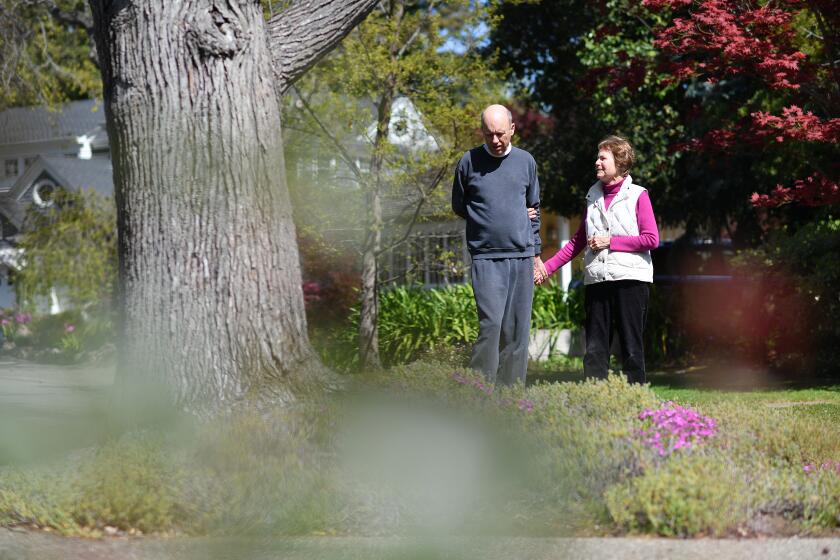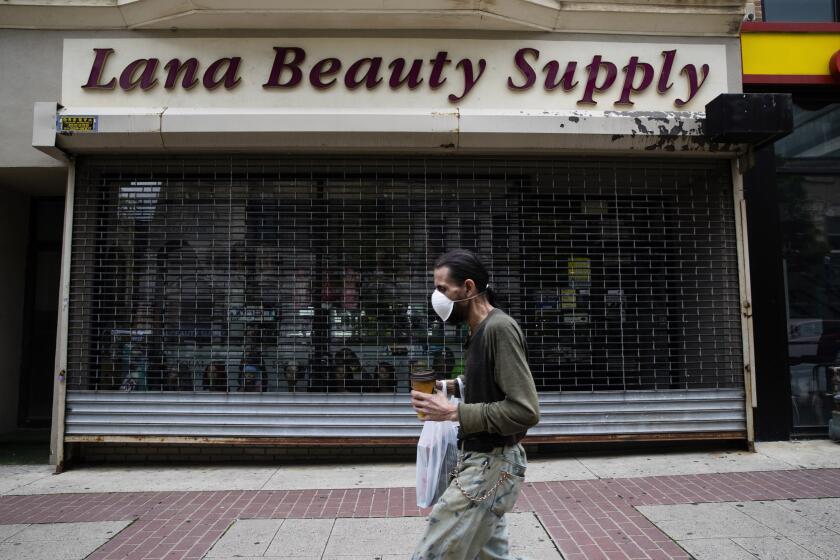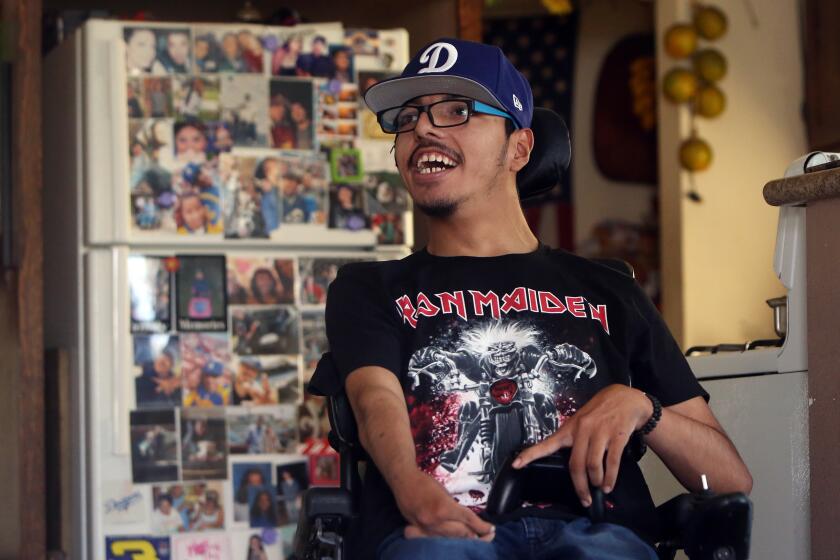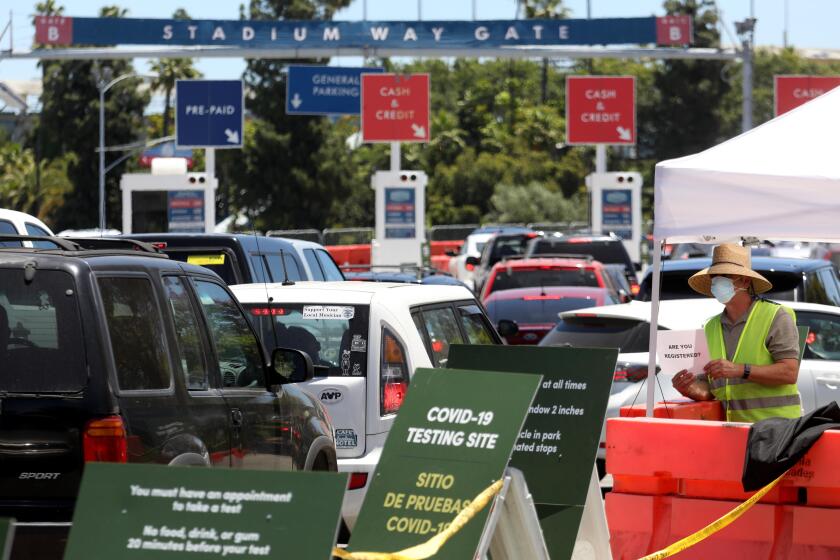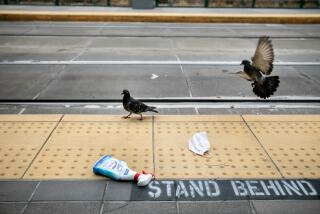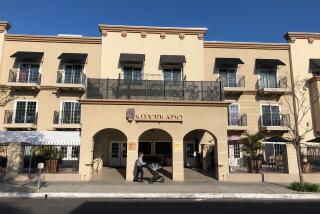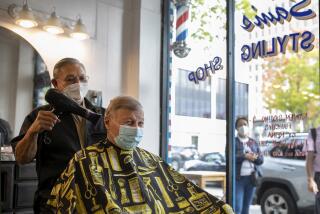Coronavirus cuts a deadly swath through homes for the disabled
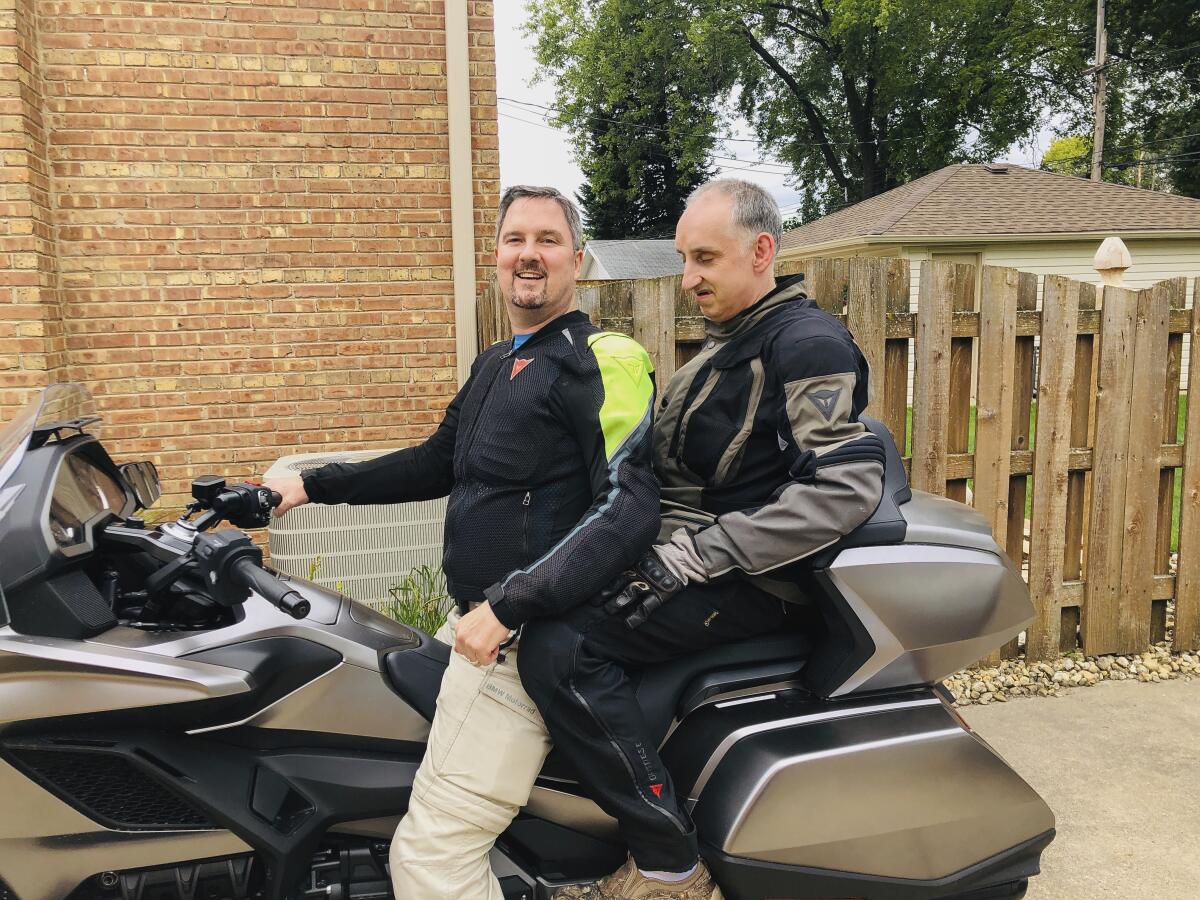
- Share via
Neil Sullivan was angry, frustrated and crushed with guilt. His brother Joe had been rushed by ambulance from his home for the developmentally disabled to the emergency room with a possible case of the coronavirus.
Neil had known that the people at the Elisabeth Ludeman Developmental Center, near Chicago, were at risk. Regulators had flagged the facility over the years for violations such as neglect of residents and not keeping restrooms stocked with soap and paper towels. And now, in the middle of a pandemic, a staffer told Neil they were still short of life-saving equipment like surgical masks, gowns, hand sanitizers and even wipes.
He watched helplessly as COVID-19 tore through Ludeman, infecting 220 residents — more than half the people living there — and 125 workers. Six residents and four staff members would die. Neil was overcome with dread that his 52-year-old brother would be among them.
“You start thinking to yourself, is there something I should have done better?” he said.
The outbreak in Ludeman shows the threat of the pandemic to a highly vulnerable population that is flying almost completely under the radar: the developmentally and intellectually disabled. While nursing homes have come under the spotlight, little attention has gone toward facilities nationwide that experts have estimated house more than 275,000 people with conditions such as Down syndrome, cerebral palsy and autism. Many residents have severe underlying medical issues that leave them vulnerable to the coronavirus.
At least 5,800 residents in such facilities nationwide have already contracted COVID-19, and more than 680 have died, The Associated Press found in a survey of every state. The true number is almost certainly much higher because about a dozen states did not respond or disclose comprehensive information, including two of the biggest, California and Texas.
Across California, thousands of families are now forced to care for severely disabled loved ones at home, including some with serious autism.
Many of these places have been at risk for infectious diseases for years, AP found.
Perhaps the best-known government-funded homes for the disabled are called Intermediate Care Facilities, which range from large state-run institutions to homes for a handful of people.
Before the coronavirus hit, regulators concluded that about 40% of these facilities — at least 2,300 — had failed to meet safety standards for preventing and controlling the spread of infections and communicable diseases, according to inspection reports obtained by AP. The failures, from 2013 to early 2019, ranged from not taking precautionary steps to limit the spread of infections to unsanitary conditions and missed signs that illnesses were passing between residents and employees.
No such data exist for thousands of other group homes for the disabled because they are less regulated. But AP found those homes have also been hit hard by the virus.
“These people are marginalized across the spectrum,” said Christopher Rodriguez, executive director at Disability Rights Louisiana, which monitors the state’s homes for the disabled. “If you have developmental disabilities, you are seen as less than human. You can see it in education, civil rights, employment. And now, you can see it by how they are being treated during the pandemic.”
Unfilled potholes, uncollected trash, unmowed grass and, most significantly, fewer cops on the street are some of what the city of Allentown, Pa., says it’s facing unless Washington helps it plug a multimillion-dollar budget hole left by the pandemic.
Advocates are urging the federal government to do more to protect the disabled in congregate settings. They noted that as the virus spread, the Centers for Medicare and Medicaid Services, or CMS, ordered states to provide information to the federal government about COVID-19 infections and deaths in nursing homes. CMS also increased fines and made data about infections in nursing homes available to the public.
But the requirements did not extend to homes for the developmentally disabled, where the overall population is smaller but the virus is still taking a heavy toll.
“The lives of people with disabilities in these settings are equally as at risk — and equally as worth protecting — as people in nursing homes,” the Consortium for Citizens with Disabilities said in a May 5 letter to Alex Azar, secretary of the U.S. Department of Health and Human Services, which oversees CMS.
CMS did not respond to the AP’s questions within two weeks and did not say why requirements are different for nursing homes. For days, the agency said it was working on a statement, but did not provide one.
Schools have been told they must provide equal learning opportunities to students with disabilities, but the schools and parents say that’s not happening during the coronavirus crisis.
About 66,000 people nationwide live in intermediate care facilities like Ludeman. Even more people live in other types of group homes, which operate under less scrutiny. Nobody, not even the federal government, seems to know exactly how many people live in these homes, which advocates say is another sign of a highly marginalized population.
More than 2,100 homes for the disabled have seen COVID-19 infections among residents or staff, according to the AP survey — an undercount because not all states provided specific information.
The virus poses an especially big risk for the disabled. Some are bedridden or prone to seizures. Others have visual or hearing impairments and are nonverbal, so they can’t articulate when they don’t feel well. And social distancing — one of the key preventive measures for COVID-19 — is nearly impossible because many residents have roommates, share common living areas and need full-time assistance for basic tasks like brushing their teeth.
“You’re dealing with a community that needs constant 24-hour, one-on-one supervision,” said Joe Montemayor, whose union represents employees at homes for the disabled in Texas. “Their reasoning isn’t quite there, so you do your best to teach them about the spread of germs and things like that.”
It’s gotten so bad that some staffers are afraid to report to work, Montemayor said.
The bulk of California’s cases are still in Los Angeles County, where officials reported 61 additional COVID-19-related deaths and 1,275 new cases on Wednesday.
Advocates also worry that the special needs and fragile medical condition of the developmentally and intellectually disabled will make them a low priority if hospitals, especially in rural areas, are overrun with COVID-19 patients. Disability rights groups have filed federal civil rights complaints against several states to stop ventilator-rationing proposals, fearing that the disabled will end up last in the line because they may not be able to adhere to protocols after an operation or procedure.
“People with disabilities have just the same right to extend their lives for as long as possible as any other human,” said Elizabeth Priaulx, a legal specialist with the National Disability Rights Network.
For the families, the fear of the virus is compounded by the fact that they can’t visit their loved ones.
When COVID-19 began spreading across the country, Neil Sullivan prayed it wouldn’t hit Ludeman — where some 340 people live in 40 ranch-style homes spread across a campus that resembles an apartment complex.
For Sullivan, the coronavirus is only the latest of a string of challenges with his brother Joe at Ludeman.
Many staff members have been kind, and Neil praised those who have worked with his brother in recent years. But some of Joe’s teeth were knocked out in the 1990s with no good explanation, Neil said. At other times, Neil suspected Joe didn’t receive the attention he needs.
“There were people there, especially in the past, that really treated them like zoo animals,” Neil said.
Ludeman has been cited dozens of times since 2013, most often for safety violations but also for more serious issues, including mistreatment of residents. While Ludeman was not cited specifically in the infection-control category, inspectors noted that staff didn’t always encourage practices like proper hand-washing.
Meghan Powers, a spokeswoman for the Illinois Department of Human Services, which oversees the facility, said the high numbers are driven in part by the fact that all residents have been tested.
“It is also sometimes challenging for our residents to adhere to all of the protective measures we are taking,” Powers said.
The agency implemented “many new protocols” at Ludeman and other facilities across the state on March 12 that included creating an infectious disease team, restricting visitors and checking the temperatures for all staff and residents at shift changes, Powers said. She acknowledged that Ludeman had challenges in the past with maintaining soap and paper towels, but she said that problem was solved by improving its supply distribution.
And while shortages of personal protection equipment were an issue across the state, staff working directly with sick residents “have never run out or been severely short to date,” Powers said.
The pandemic’s toll: Lives lost in California
Hundreds of people have died in California due to the COVID-19 pandemic. These are some of their stories.
Like Ludeman, many other homes for the disabled have struggled to contain outbreaks, AP found.
Nearly half of the 2,300 Intermediate Care Facilities with past problems controlling infections were cited multiple times — some chronically so, over the course of multiple inspections. In dozens of instances, the problems weren’t corrected by the time regulators showed up for a follow-up visit. At least seven times, the safety lapses were so serious that they placed residents’ health in “immediate jeopardy,” a finding that requires make prompt corrections under the threat of a losing government funding.
The outbreak at Ludeman was so bad that the National Guard was called in to help. A family association asking for supplies said Chicago’s Major League Baseball teams donated 2,200 rain ponchos that the staff could use “until disposable gowns are available.”
When Neil Sullivan got the call that his brother was infected with COVID-19, all the years of frustration spilled over. After finding out his brother was being rushed to the emergency room, Neil called Ludeman’s staff and talked to other families. He decided to make a trip to Ludeman. He didn’t even know if they’d let him onto the campus — the facility was on lockdown. But he was going to try.
As he pulled up to the red and brown brick building with white trim, he got a surprise. There was Joe, sitting in a room with a staff member. Neil’s heart raced. He smiled, then waved to his brother through the window.
“I can tell you it made a world of difference because I really, genuinely believed he was going to die until I saw him,” he said. “Once I put my eyes on him, he still didn’t look good. But I believed he was going to pull through.”
In the end, Joe would beat the virus. Others wouldn’t be so fortunate.
More to Read
Sign up for Essential California
The most important California stories and recommendations in your inbox every morning.
You may occasionally receive promotional content from the Los Angeles Times.
